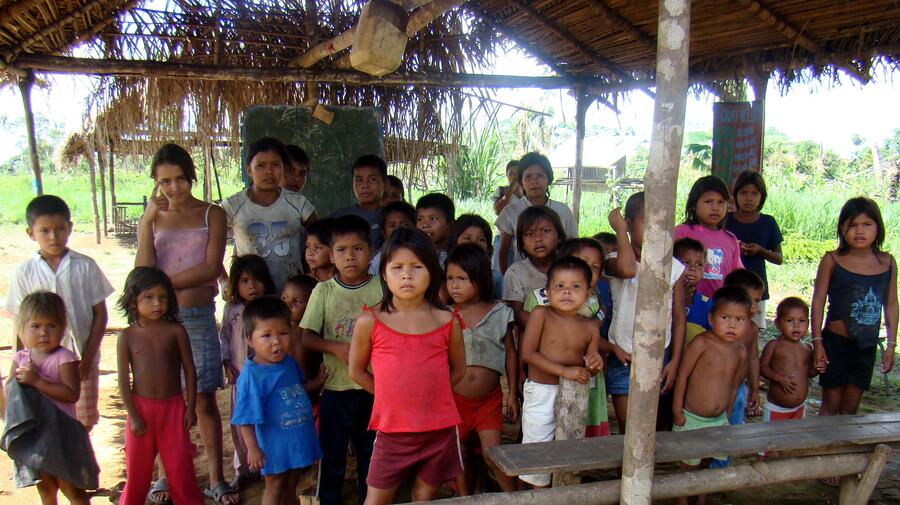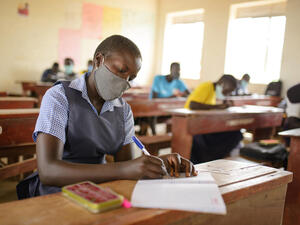Armed recruitment of children in Colombia forces indigenous off their land
Armed recruitment of children in Colombia forces indigenous off their land

Indigenous children in the 'boarding school' of Bocas de Yi, a community that has suffered badly from forced recruitment in the past year.
MITU, COLOMBIA, August 12 (UNHCR) - In a distant corner of Colombia on the border with Brazil, the department of Vaupes is home to 27 different indigenous groups, each with a different culture and language. But confronted by conflict and forced displacement, many are at risk of not surviving.
The Vaupes region is remote, extending over more than 50,000 square kilometers of jungle and rivers. There are just 16 kilometres of paved road circling the small city of Mitu, which is linked to the country's capital, Bogotá, by just two flights a week. The Rio Vaupes provides the only other means of transportation to the outside world.
The region is also a stronghold of one of the country's largest irregular armed groups, which controls the rural areas while the national armed forces seek to reassert themselves beyond the city. Many communities along the river live in forced isolation and virtual confinement. The security situation often leaves individuals with no alternative but to flee.
"In the past two years, the leading cause of forced displacement has been the recruitment of indigenous children by illegal armed groups," a local state employee in Mitu told UNHCR. In 2008, some 500 families fled their homes, most because their children were about to be taken into illegal groups.
Children as young as 13 have been recruited, and both boys and girls are at risk. The regional indigenous council, known as CRIVA in Spanish, is particularly concerned about recruitment among indigenous groups at risk of extinction. One of the most urgent cases is that of the Pizamira. With a population of less than 50, three children were recruited last year.
"Many of the parents have gone into the forest to look for their children, but they couldn't get them back," one council member told UNHCR.
Some 42 indigenous minors have been taken into illegal groups since the start of 2008, according to CRIVA. Eleven of them were students at a boarding school in Bocas de Yi, an indigenous community on a bend of the Rio Vaupes that houses children from all over the river to give them a chance to study.
Residents of Bocas de Yi live in complete isolation, with no access to basic services. Some 200 local people share what few resources exist with 160 children studying at the school. The boarding school has no water, electricity or toilets. Some children sleep in hammocks, others on the floor.
"Most of the children stay here all year-long because going home is too far or too dangerous. The conditions here are very, very hard, year after year," according to a teacher. "These children have no real hope and it makes them terribly vulnerable to other options some unscrupulous people may offer them," he said.
Not all forced recruitment is conducted violently. One of the most common methods is to make young people "fall in love", as the locals say, with indoctrination and promises of a better life. Under humanitarian law any recruitment of minors into illegal armed groups is defined as forced recruitment, whether or not the child believes he wants to join.
Rather than take the risk of losing their children, many families prefer to flee. About 3,000 people, or 1o per cent of the population of Vaupes, have fled their homes.
UNHCR is also working with the military in Vaupes as part of a national training initiative to improve knowledge of the rights of the displaced.
"In Colombia, military personnel are often the first or only state presence in communities at risk," said Roberto Mignone, UNHCR's Deputy Representative in Colombia. "The armed forces have a very significant role to play both in protection and prevention of forced displacement,"
Because of their strong cultural, social and economic links to the land, forced displacement is especially hard for indigenous people, and can lead to the disappearance of entire groups. According to Colombia's Constitutional Court, a third of the 90 different ethnic groups in the country are at risk.
By Marie-Hélène Verney
In Mitu, Colombia








